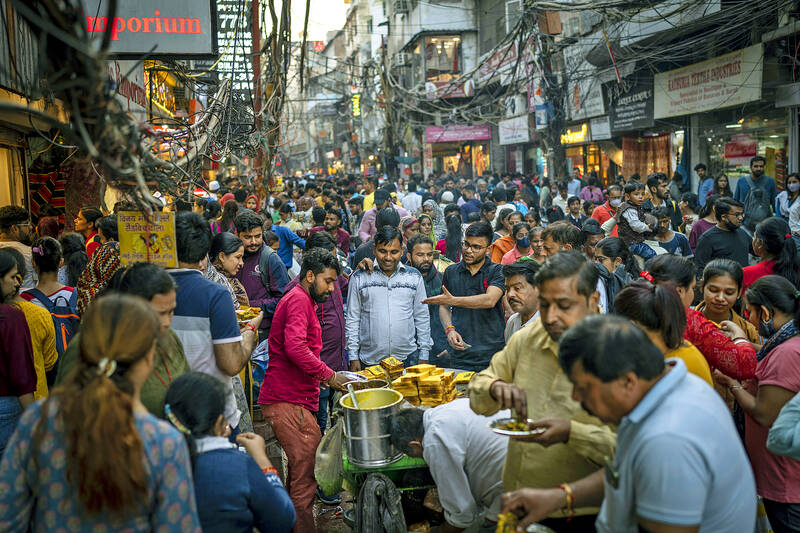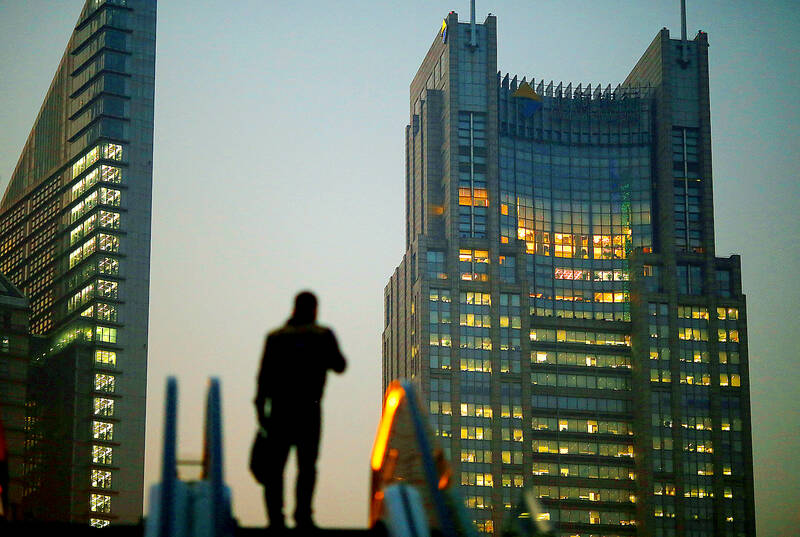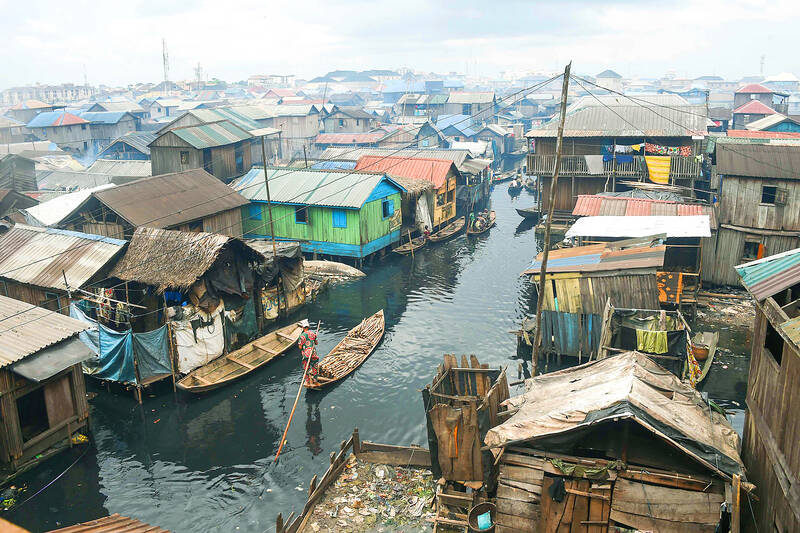On the day India surpasses China as the world’s most populous nation, the change for both countries will be psychological and symbolic.
China will still be the greater economic power, the one challenging the US for full superpower status, but it will no longer be able to call itself the largest nation by sheer numbers.
On present trends, the population gap will continue to widen rapidly, but what that will mean for their relative clout in the world will be decided by a host of other factors such as investment and governance. Demographics are not destiny.

Photo: AP
POPULATION CONTRACTION
However, the moment the baton is passed to India will plant a seed of doubt, hinting at possible limits to China’s relentless rise in the 21st century. China’s population of 1.4 billion is expected to start shrinking soon and at an increasing rate.
“The presumption was that they were going to max out in population in 2028, but now it looks like they already have, and that’s a very big change,” said Ian Bremmer, the president and founder of Eurasia Group, a political risk research and consulting firm.

Photo: Reuters
“The Chinese are facing a population contraction that is far greater than anything experienced by Japan or South Korea, and they’re going to be facing it as they’re still only a middle income economy, so this is a huge challenge for them,” he added.
Not only will Chinese population shrink, but its age profile will also change. The bulge will no longer be in the working-age generation, but increasingly among elderly people. The number of Chinese citizens over 65 will more than double by 2050, from 150 million to 330 million. There will be fewer and fewer people whose labor will support more and more retirees. The profile will cease to resemble an onion dome on a Russian church and start to look like a kite, or a coffin.
The Chinese leadership could find ways of allowing the country to grow, through increasing the productivity of those in work, but it will take capital — and more and more of it as time goes on. China is in a race, trying to get rich before it gets old.

Photo: AFP
Through that prism, China’s military spending is a bet that it will bend a large part of the world to its will so that it gains privileged access to resources. But if that bet fails, Beijing will have spent a lot of capital that could have been used to adapt its economy to the encroaching limits, leaving the country stuck in a middle-income trap.
India will face similar dilemmas as its population grows. There will be more Indians of working age in relation to the elderly parents they will have to fund, but the leadership will have to be agile to reap the demographic dividend.
“The demographic dividend doesn’t happen automatically, because that big group of young working-age people need to have work and they need to be productive,” said Stuart Gietel-Basten, professor of humanities and social sciences at Khalifa University in Abu Dhabi.
Some countries have managed to seize the opportunity offered by the demographic dividend, like South Korea and Singapore. Those that have not face the challenge of increasing the number of young people unable to find a job, raising the prospect of unrest, which were the dynamics underlying the 2011 Arab spring in Tunisia, Egypt and Syria.
The determinants of success or failure can be many and varied, Gietel-Basten suggested. “It will be about resources, about governance, about infrastructure, about location,” he said.
Carla Norrlof, professor of political science at the University of Toronto, points out that outside powers such as the US could seek to have an influence on the relative development of the two population giants, by calibrating access to the technologies that will help determine growth in both.
“The US now is really set on limiting China’s economic influence, and so India might kind of piggyback on that if it’s not being targeted in terms of technology restrictions,” Norrlof said.
AFRICA BENEFITS?
By 2050, the current trends suggest, only a few countries will be accounting for all the world’s population growth, most of them in Africa.
Hans Rosling, a Swedish physician and academic, said the world’s current “pin code” was 1114, meaning there are very roughly 1 billion people in the Americas, Europe and Africa and 4 billion in Asia. In 2050, the code will be 1145, with 4 billion in Africa and 5 billion in Asia.
It is possible countries such as Nigeria or Ethiopia could reap a dividend and vault out of poverty. Whether they do or not, Africa’s severe under-representation in global institutions, starting with the UN, is unlikely to be tenable. Stewart Patrick, the director of the global order and institutions program at the Carnegie Endowment for International Peace, said that as continent’s population grows it will be the focus of ever more geopolitical wrangling.
“It will be a second scramble for Africa, with pretty strong competition,” Patrick said. “Africa is obviously a source of tremendous amount of raw materials, including oil and gas but then also raw materials for the clean energy transition, the sort of minerals that one needs to build batteries and things like that.”
The degree to which African countries are able to manage their growth successfully will only increase the amount of fossil fuels their rising populations will require to meet their expectations.
That bulge in energy demand will not be offset by China’s population decline, because its smaller population will still be straining for middle-class lifestyles, which consume much more energy.
The steeper the demographic gradient grows between a burgeoning global south and a contracting north, the greater the pressure of migration.
It would make economic sense for wealthy shrinking nations in North America and Europe to take in people to do the work to support their ageing populations, but that brings a backlash.
“There might be some kind of realization that aging populations in wealthy countries is a real problem and they need to import more labor,” Norrlof said. “But I think that in the current political climate, that’s not what we’re seeing at all.

Climate change, political headwinds and diverging market dynamics around the world have pushed coffee prices to fresh records, jacking up the cost of your everyday brew or a barista’s signature macchiato. While the current hot streak may calm down in the coming months, experts and industry insiders expect volatility will remain the watchword, giving little visibility for producers — two-thirds of whom farm parcels of less than one hectare. METEORIC RISE The price of arabica beans listed in New York surged by 90 percent last year, smashing on Dec. 10 a record dating from 1977 — US$3.48 per pound. Robusta prices have

The resignation of Taiwan People’s Party (TPP) co-founder Ko Wen-je (柯文哲) as party chair on Jan. 1 has led to an interesting battle between two leading party figures, Huang Kuo-chang (黃國昌) and Tsai Pi-ru (蔡壁如). For years the party has been a one-man show, but with Ko being held incommunicado while on trial for corruption, the new chair’s leadership could be make or break for the young party. Not only are the two very different in style, their backgrounds are very different. Tsai is a co-founder of the TPP and has been with Ko from the very beginning. Huang has

A dozen excited 10-year-olds are bouncing in their chairs. The small classroom’s walls are lined with racks of wetsuits and water equipment, and decorated with posters of turtles. But the students’ eyes are trained on their teacher, Tseng Ching-ming, describing the currents and sea conditions at nearby Banana Bay, where they’ll soon be going. “Today you have one mission: to take off your equipment and float in the water,” he says. Some of the kids grin, nervously. They don’t know it, but the students from Kenting-Eluan elementary school on Taiwan’s southernmost point, are rare among their peers and predecessors. Despite most of

A few years ago, getting a visa to visit China was a “ball ache,” says Kate Murray. The Australian was going for a four-day trade show, but the visa required a formal invitation from the organizers and what felt like “a thousand forms.” “They wanted so many details about your life and personal life,” she tells the Guardian. “The paperwork was bonkers.” But were she to go back again now, Murray could just jump on the plane. Australians are among citizens of almost 40 countries for which China now waives visas for business, tourism or family visits for up to four weeks. It’s